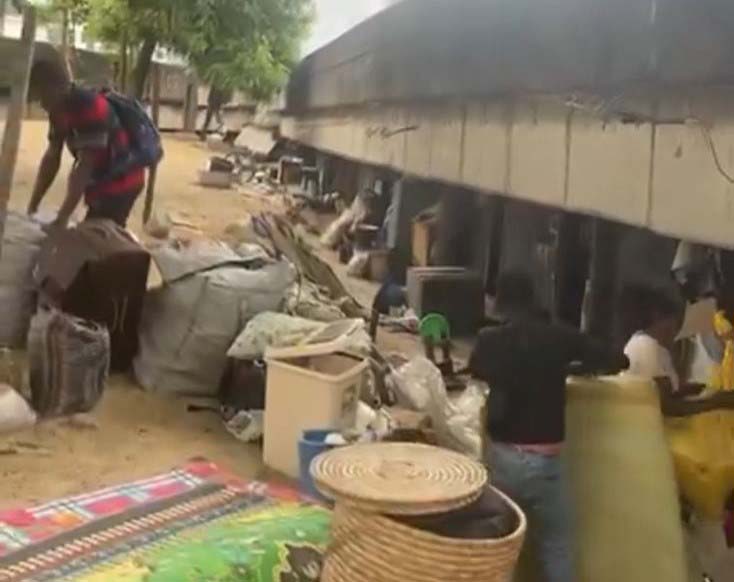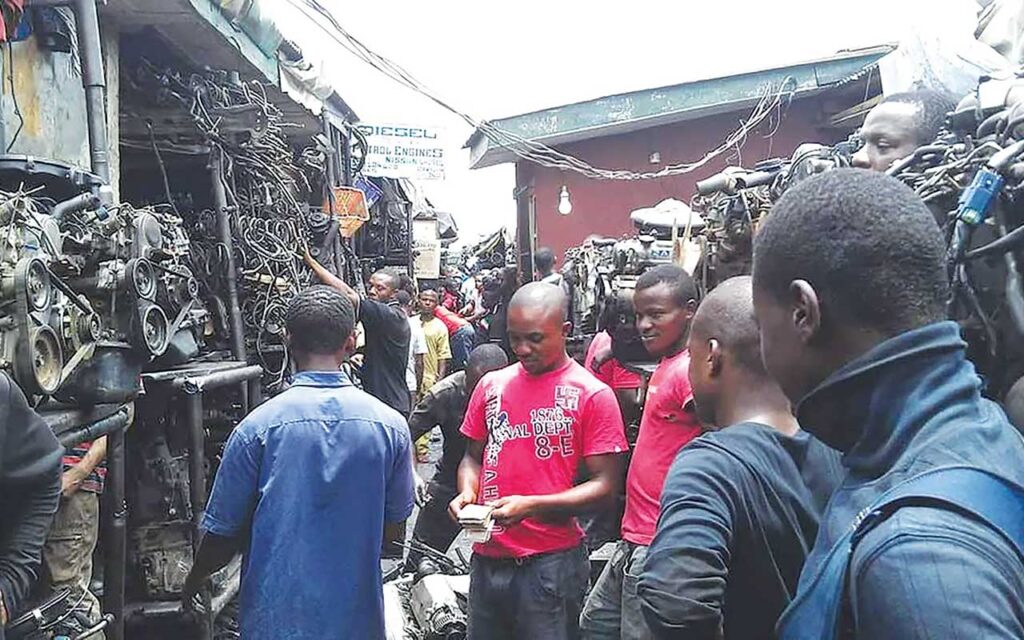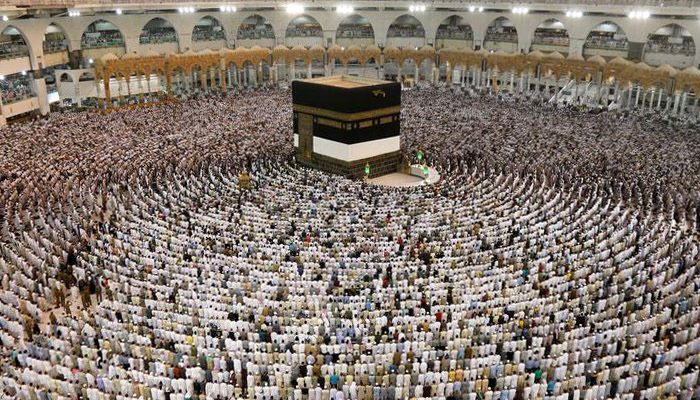
Rural-urban migration has been one of the major factors driving under-bridge dwellings in Lagos State. With its size as the smallest state in the country (by land mass), the pressure of overpopulation, forced evictions, high cost of rent, and ongoing demolitions have jointly exacerbated homelessness in the state. FELICITAS OFFORJAMAH writes that viable policy options are needed to curb this menace.
Despite shelter being one of the necessities of life, homelessness in the country has been receiving a boost of late with the recent demolition of structures in Lagos and Delta states by the respective governments.
As has been the case whenever such exercises are carried out, the hapless victims are accusing both state governments of being insensitive to the plight of the poor, as well as their failure to duly notify them before carrying out the demolitions.
The governments on their part have accused the victims of illegally occupying public spaces, breaching the state’s town planning laws, and generally hurting the environment with their unapproved and unplanned development.
But as the accusations and counter-accusations waft across, the nation’s housing deficit continues to blossom, while affordable housing remains a luxury.
For Gloria Amejo, a mother of three and one of the victims of the demolition carried out by the Lagos State government under the Dolphin Bridge, nothing could be more gruel than being made homeless just two years after arriving with her husband and children to chase her “Lagos dream.”
As she breastfed her last baby amid napping cart pushers wheelbarrow pushers, cobblers, and sundry characters, she told The Guardian that with the demolition, the government has created “unimaginable and unnecessary evil for her.”
Driving away flies that encircled her and her baby, Amejo said: “Most people always believe that they will make it in Lagos, and that’s why we travelled all the way here. But what we met was not what we expected. My husband’s monthly salary is N50,000, and it was difficult to get a house that we could afford in this Ikoyi area.
“So, we paid N20,000 to stay under the bridge pending when we would be able to save enough to get a house, and even a better job.”
With their eviction from under the Dolphin Bridge, Amejo and her family now stay at an abandoned shop in Obalende.
With bloodshot eyes staring into an uncertain future, Babatunde, another victim of the demolition exercise, appears bewildered. But amid his bewilderment, he told The Guardian: “I work as a driver in one of the companies here at Ikoyi. I must stay nearby so that I can reach the office before 5:00 a.m. to begin work on time, even though I will eventually get home by 9:30 p.m. every day.
“I was saddened when I came back on that fateful day to see my luggage scattered around. I don’t know why the government is treating us like criminals. We no get house, na our problem? No be government cause am. And dem no even give us alternatives, dem go just scatter us like that…?”
Babatunde, who said that he must secure his job either way, added that his only option at the moment was to appeal to a friend to allow him to stay in his commercial bus after work until he could sort out his accommodation issues.
Narrating his experience living under the bridge, Babatunde said: “I am not aware that people paid up to N250,000 as rent there because I paid N30,000 to stay there. One man whom I suspect is ‘the landlord’ gave me a bank account number that I paid the money. He said as long as I pay the rent on time, he won’t disturb me. And I have been paying since, and there was no problem.”
Another resident, Dorcas Eke, who claimed to be a graduate of Education from Kwara State University, started living under Obalende Bridge after her parents died in an auto crash.
“We lost everything when our shop caught fire and two weeks later, my parents died. The few relatives that I had didn’t want extra responsibilities, so, I had to fend for myself somehow, and that’s how I found myself sleeping under the bridge,” she said.
Research has shown that about two-thirds of the population of Lagos dwells in informal settlements, including unapproved developments, abandoned buildings, or partially constructed buildings.
According to experts, the situation has been exacerbated due to several issues, including the state’s tenancy laws being tilted to favour house owners, the economic situation, forced evictions, and the gale of demolitions.
In the Oworonshoki area of the state, Osiko Daniels told The Guardian that the state government didn’t give him any notice until he saw his four-bedroom apartment brought down by bulldozers.
He said: “I’m now rendered homeless since the government demolished my house for whatever reason. And if we try to get justice or any compensation, our efforts are frustrated. The agony I’m passing through will lay a curse on the people who demolished the house that I built with my sweat. My family and I are currently staying with a family member,” he lamented.
But explaining the Oworonshoki demolitions, the state’s Commissioner for Housing, Moruf Akinderu Fatai, said that it was to make room for new housing developments, adding that victims that habited the “shanties” were informed in advance of the demolition.
This position was, however, countered by the locals who said that they were not given adequate compensation if any at all, even as they pointed out that they would not be able to afford the new apartments.
Also, Amnesty International in its report stated that residents were given no prior notice of the demolition of their homes and property.
Last year, data from World Population Review revealed that Nigeria has the world’s greatest number of homeless people with 24 million people not having homes.
The report, which painted something akin to an epidemic of homelessness stated: “Over 24 million people are considered homeless, with many more not having appropriate access to a proper dwelling that has access to some of the most basic services. With this being said, Nigeria is not as deep in poverty as others may think, as there are a lot of resources contained within the country. Much of the issue is due to access to wealth, which is often exploited by other countries, or even their state.
“Furthermore, because of its large size, Nigerians experience a huge influx of both immigration and emigration, which changes the ownership of houses frequently. This could be a good thing, in theory, but usually, this also means that natural gentrification occurs, as investors are looking to build more elaborate and expensive houses to procure a higher rental income, or to flip into a more profitable business venture.”
Considering that the country’s population will double by 2050, and the increased rate of movement to Lagos for improved standard of living, the homelessness virus, if not cured, might shock Nigerians with its result.
Real Estate Expert and lecturer at the University of Lagos, Prof. Gbenga Nubi, said that homelessness would continue to rise as the economy gradually slides into depression and the rate of unemployment soars. “Many Nigerians are homeless. To have a home is to have privacy, dignity, and protection. So, if any of these characteristics is not there, you are not adequately housed. Unfortunately, it’s going to rise because the supply of houses is lower than the demand.”
X-raying the payment of rent to some unscrupulous “landlords” by under-the-bridge dwellers Nubi stated: “You can’t lease out a public space that belongs to the government. That’s illegal and criminal. Those individuals should be brought to book. However, the scenario brings to focus, the fact that these people have money to pay, but not enough to rent a suitable home in Lagos and this is where subsidy comes in.
“Government needs to subsidise highbrow areas in Lagos like the Ikeja axis for average and key workers. It’s not rocket science.
Social housing policy can work in Nigeria if we run an efficient and incorrupt system. The government must invest in social housing; we must do it. There’s nothing impossible if we put our heart to it. All over the world, social housing has been used to turn around lives.”
A housing expert and Director of Sales for Fountain Havens, Ruona Oghuvbu, said that another important policy option would be for the government to provide temporary housing for people who cannot afford to rent a house.
This, he said is in line with international practices where governments guarantee that all citizens, regardless of class, have roofs over their heads.
According to him, citizens also have a role to play in solving housing problems in Lagos State.
“As a player in the real estate sector, we have experienced challenges like multiple owners to a particular property. Imagine the headache one goes through in trying to acquire that property – a property that has no single owner.
“Lagosians are faced with a housing problem that stakeholders need to gather, talk about, and implement. We have a long way to go.”
The Co-founder of Rethinking Cities, an advocacy group, Deji Akinpelu, said life under the bridge, or the case of homelessness in Lagos, deserves to be well understood and put in proper context, and that like every urban city in the world, Lagos is bound to experience migration from within and outside the country.
“Coupled with the crisis of insecurity across the nation, this has become inevitable. It is a global trend, as 50 per cent of the world’s population now live in urban cities, people tend to migrate to seek major economic opportunities among other factors.
“However, the response in terms of policy and practice will determine how we can successfully manage this situation. Criminalising homelessness is certainly not the way out.”
Akinpelu said while it is commendable that we are trying to bring law and order to the city, there is a major cause of homelessness in the city.
“First, by capturing their data and understanding the demography of these migrants and their pattern of livelihood. With this understanding, a proper design can be put in place to address the challenge.
“The government needs to understand that clearing the bridges doesn’t stop migration patterns, the challenges of homelessness, or the increase in slum settlements. The people only move to new locations within the state. This is the pattern we have seen in our studies. Removing one settlement only increases the population of another settlement, or even creates another settlement in another place. So it is a vicious circle,” he said.
Akinpelu stressed that homelessness soared high in Lagos because residents are not in the know of what the state government is doing about their plight.
He added that there must be concrete provisions for those without a place to call home.
“Specifically, what social housing or affordable housing initiatives exist to support vulnerable individuals? What land titling policy will enable informal settlements to upgrade their communities?
“If the government finds out that the squatters are paying N250,000 per year, it underscores the urgency of providing accessible and affordable housing options.
“Government should allocate resources to create social housing at a comparable rate and cross-fund affordable housing from luxury housing.”
On its part, the state government has affirmed its readiness to provide more homes by speedily completing ongoing housing schemes across the state.
Commissioner Fatai said in a bid to promote fairness and transparency in the process of becoming homeowners, the ballot system will be used in getting houses in its various housing estates by June.
According to him, housing is an issue of demand and supply.
“Lagos is one of the prosperous states and everybody wants to come here and make money. It’s unfortunate that when the demand is more than the supply, especially in this housing situation, there will be a crisis.”
Fatai added that currently, the ministry has five ongoing housing schemes, which is the Egan-Igando Mixed Housing Scheme with a total 846 units in the Igando-Ikotun Local Council Development Area (LCDA).
According to him, this project is divided into three clusters, and its first cluster with 270 units of two-bedroom flats is completed and ready to be commissioned and handed over to the subscribers.












